2021 NERS enhancements:
The Leganto NERS voting cycle will begin in January. Start thinking now about the changes, developments or improvements you would like to see to Leganto in 2021. There may be suggestions you or your colleagues have made on Ideas Exchange that you’d like to put forward to NERS. You may also wish to consider working collaboratively at a local or national level to co-ordinate voting on an enhancement – this is allowed!
As a reminder, each institution has 100 development points to allocate to the shortlist of enhancement requests which are then put forward to Ex Libris who allocate complexity points to each request. A second round of voting may be required before the enhancements to be developed are agreed.
The final timeline and further details for the NERS voting process will be circulated via the Leganto mailing list early in the New Year.
Leganto UX/UI Focus Group:
To enhance the user experience of using the Leganto UI/UX Product, Dolav Ben-Artzi, has been working with the focus group members to collect views and real-life experiences from the users for improving the UI/UX design of Leganto.
The UX/UI Focus Group Members comprise of the following members from different zones:
APAC
• Shameem Nilofar, Singapore Management University
• Peta Hopkins, Bond University
• Jeff Liu, Lingnan University
Europe
• Paul Harding, University of York
• Ann-Louise Skjager, Oslo Metropolitan University
North America
• Kirsten Clark, University of Minnesota
• Dan Hoiland, Concordia University
Each focus group member has nominated one to two teaching staff from their institution. Twelve instructors in total were interviewed by Ex Libris during the period from July to August 2020. The aim of the interviews was to understand user behaviour towards the Leganto UI/UX Product and to collect comments/views from the user interface point of view. The result of the findings has been shared among the focus group members at ongoing meetings from September 2020.
Testing the accessibility of Leganto with students at the University of Cambridge:
David Marshall, Head of Assessment and User Experience, Cambridge University Libraries, in collaboration with Libby Tilley, Education Lead, Cambridge University Libraries and John Harding, Head of the University of Cambridge Disability Resource Centre
During September 2020, in anticipation of supporting students using Leganto (known locally as ‘Reading Lists Online’) during academic year 2020/21, Cambridge University Libraries conducted remote accessibility testing and research with a sample of 7 students, including visually impaired students using screen reader software and students with Specific Learning Difficulties. This provided an opportunity to ensure that users’ experiences of working with Leganto feed into its ongoing development at Cambridge.
Rather than testing specific areas of compliance with the WCAG 2.1AA guidelines, for example, the exercise comprised of a broad review of the relative accessibility of aspects of Leganto, for both sighted and non-sighted users. Student participants worked with Leganto in their own time for around one hour each, exploring the system the way they would naturally and completing scripted tasks, recording aspects that they found accessible or inaccessible, any changes they made to improve accessibility and comparing Leganto to other reading list options they had used in the past, amongst other things.
Insights from the work include:
• A desire from students to be able to (re)structure content within Leganto, whether items within reading lists or within their personal ‘Collection’ area.
• Good navigation in general for screen reader users, with some significant known issues, including unlabelled interface aspects and difficulties in navigating lists using headings.
• Difficulties for screen reader users in identifying resource types for online content linked to from Leganto.
• A concern from students about the amount of textual information presented in one reading list and the structure of this information. This was the case for sighted and non-sighted users.
• A relative lack of visibility of the Accessibility Menu in Leganto, with students using browser and device accessibility functionality, with sub-optimal results.
These and other insights from the work will feed into local guidance and advice for students using Leganto at the University of Cambridge, as well as local configuration opportunities. A list of key insights and issues identified has been reported back to Ex Libris.
If you wish to discuss our more detailed insights, or any other aspect of this work, please contact David Marshall – dm622@cam.ac.uk
